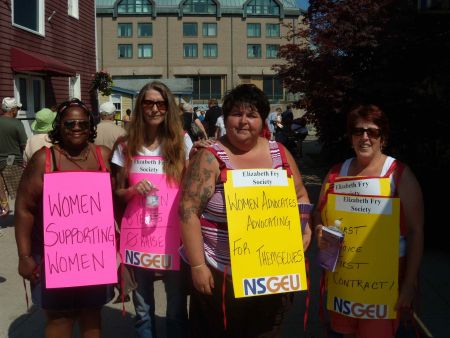Halifax - Despite the beautiful sunny day on the Halifax waterfront, Heather McKenzie says she’d much rather be at work than walking the picket line.
“We didn’t want it to have to come to this,” says McKenzie, community and provincial outreach support coordinator for the Elizabeth Fry Society of Mainland Nova Scotia and member of Nova Scotia Government & General Employees Union (NSGEU) Local 68.
“But we are advocates, and we are women, and we advocate for women, so we have to advocate for ourselves,” says McKenzie. “We have to show the women that we serve that we lead by example – that when we tell them they have to stand up for their rights, that we need to do the same.”
McKenzie and her three co-workers have been off the job since July 11. At issue are the workers’ wages, which have not been raised in six years.
The workers are asking for a one per cent wage increase each of the next two years, the total cost of which would be $7,500, over three years. Kelly Ryan of the Elizabeth Fry Society’s board told CBC this amount of money could put the organization at risk of shutting down.
McKenzie lists a range of services she and her co-workers provide to women involved, or at risk of being involved, in the legal system. “I find out what their needs are and I meet their needs,” she says.
At the women’s unit of the Central Nova Scotia Correctional Facility in Dartmouth, “I make sure women are okay out there, that they have their rights … I make a plan for when they are released from prison … I talk to them about where they are going to be living, how are they going to be supporting themselves, what kind of support people do they have … I help them create a network of support if they don’t have support,” says McKenzie.
“Maybe they need some education … maybe they need employment training,” she adds. “We also have an addictions counselor … maybe she wants to go to some sort of long-term treatment, and I will talk to the people that can provide that.”
McKenzie says she sees every day the positive effects on the society’s work.
“I see women that have no hope. They’ve given up on themselves,” she says. “[W]e try to give them hope … to help them see that they have potential, that they are wonderful people …
[M]aybe they’ve made mistakes, but that doesn’t make them bad people.”
Since before the labour-management dispute began, McKenzie and her colleagues have said the decision to strike was a heart-wrenching one.
“All we’re asking … from our employers … [is] to support the women here in this organization,” McKenzie says.
“We want to go back to the table. We want to get back to work and we want to to get back to the women. They are what is important to us, and our employers know that.”



